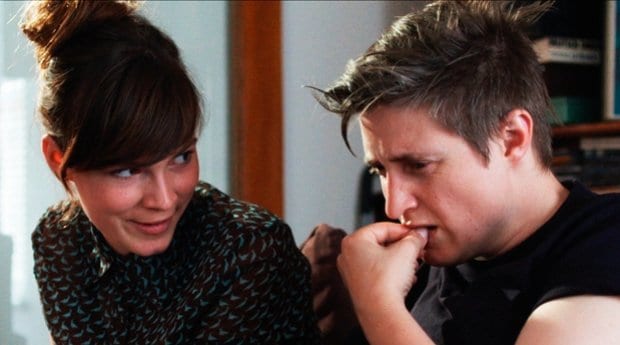Billie is a 16-year-old girl whose mother wants to become a man named James. At the outset of 52 Tuesdays, James decides he needs time to himself while he’s changing his gender, so he sends Billie to live with her father, Tom. Seeing Billie’s distress, James proposes that during the year they’re apart they will be sure to spend time together every Tuesday.
One of the film’s strengths is how thoroughly it covers the process of transition. It’s told from Billie’s point of view; every Tuesday, we see what James goes through to achieve his goal, from gaining approval for hormone therapy, through chest surgery and beyond. We’re also given a sense of the many joys and difficulties the process entails.
Refreshingly, Billie isn’t upset that her mother is becoming a man. Far from engaging in transphobic rants, she accepts James’s choice, cheering after his first testosterone shot and complimenting his new sideburns. With genuine curiosity, Billie asks, Do I call you Dad now? If testosterone makes you go bald, that means it’s working, right? So that’s a good thing? If you’re with a woman, does that make the woman lesbian or straight?
The difficulty lies in the emotional distance that forms between Billie and James. Billie used to idolize her mother — she talked to her about everything and her mother was there for every major event — but when James decides to transition, Billie is the last person he tells. Billie wonders if James wishes he’d been born a man and would therefore never have had her. Feeling alienated, Billie starts exploring her sexuality through clandestine and risky interactions with a boy and girl she meets at school.
In brief clips interspersed throughout the film, Billie, played by Tilda Cobham-Hervey, talks directly to the camera, providing insight into something we’ve just seen. She often prompts, “Okay, watch this” — as though viewers would shut the film off if she didn’t tell us not to. At other times, Cobham-Hervey sits with her mouth dangling open and bangs askew, as if she’s trying to look upset but instead landing somewhere between seductive and stunned.
But these peculiar interludes detract only a little from the film. With clever dialogue, unexpected sexiness and an almost total lack of cliché, the film tells the story of how a mother (throughout the film, Billie refers to James as “he” but still considers him her mother) and daughter find their respective selves and adapt to their changing relationship.
52 Tuesdays
Sat, Oct 25, 9:30pm
Bytowne Cinema
325 Rideau St


 Why you can trust Xtra
Why you can trust Xtra


